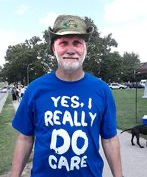Chris Roesel (Guatemala) has published HOW TO IMPROVE THE WORLD QUICKLY

Chris Roesel
Based on having worked in numerous developing countries, initially as a Peace Corps Volunteer in Guatemala, then in Asia, Africa and the Americas, and my studies at Johns Hopkins School of Public Health, the following is the program I have developed, and discuss fully in How to Improve the World Quickly to improve the health, nutrition and water quality of any community in the world.
• Require upfront community buy-in for collaboration;
• Meet and consult the local authorities;
• Convene a community meeting and plan with the community, using the Future Search Conference Methodology (futuresearch.net/methodology), condensed into two days;
• Initiate baseline survey of water, diarrhea, malaria, and income;
• Invite bids for state of the art work from local contractors;
• Sign and supervise contracts;
• Install at least one well and rainwater collection facility;
• Refurbish or build latrines.
• Ensure malaria prevention (LLITNs—long lasting insecticide treated mosquito nets) and treatment;
• With support of other organizations, establish microloans groups or other means of income improvement.
• Celebrate and conduct initial evaluation of work.
• Evaluate impact one year later with support of the District Health Office.
•
 How to Improve the World Quickly
How to Improve the World Quickly
Christopher J. Roesel (Guatemala 1973–75)
Peace Corps Writers
August 2021
114 pages
$12.00 (paperback)
Chris, I’ve followed you on several of your projects via social media. I think you’re on to something. And even though you’re dealing with seemingly unimaginable challenges–there’s something to be said for showing some improvements–quickly. All the best with your new book!
Mark
Thank you, Mark. We both got our introductions to the towering tasks in Guatemala.
Chris- Looks like an excellent little guidebook for Community Development with updated resource suggestions. Our church works with the Living Waters Project. I will be looking to pass it on to them.
Thank you, Jeremy. I tried to provide my best understanding of how to help impoverished communities.
I just ordered your book. I think it will be an excellent reference and answer many of my questions. Thank you.
But I will ask you, now, the perpetual question I have been asking since I was a “health educator” in Colombia 1963-65. In those times and my country and others, the energy infrastructure was insufficient to always properly sterilize needles and surgical tools and other items which were routinely used by many people. This was so true when vaccinations were done away from medical facilities. Alcohol wipes and bunson burners were sometimes available, but not always effective. Many diseases, including HIV/AIDs could be spread by dirty needles and other surgical tools.
Did you see this as a problem? How was it handled during your service? Can’t wait to read the book!
Thank you so much for hiring me with WIC. I didn’t realize the gift you gave me, at the time. But now, at 62, I’m retiring as a regional coordinator, and I am forever thankful for you, for giving me that opportunity. It’s been 25 years! How time flies, when you love what you do!
Congratulations on getting your book published Chris!